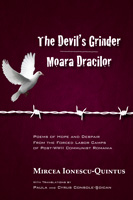 Titles by Mircea Ionescu-Quintus
Titles by Mircea Ionescu-Quintus
|
|


Mircea Ionescu-Quintus
A Brief Biography (link) |
The Devil's Grinder |
Moara Dracilor
Poems of Hope and Despair From the Forced Labor Camps of Post-WWII Communist Romania
A dual-language Edition
With Translations by
Paula and Cyrus Console-Şoican
August 2013
ISBN 978-1-930972-810
211 pages • 5 x 7.5 • Paperback
$24.95
|
|

Mircea Ionescu-Quintus
—a lawyer by profession—is one of the most respected statesmen in Romania, where he resides. He re-entered politics at the onset of the Romanian Revolution and the momentous fall of Communism, which was marked by the internationally televised execution of dictator Nicolae Ceaușescu in December of 1989. In the aftermath, Mr. Quintus's role was pivotal in the re-establishment of one of the most important democratic political parties in Romania which Communism had outlawed: the National Liberal Party, whose president he became. In the course of his political career Mr. Quintus served his country in various capacities including as Vice President of the Assembly of Deputies (1990–1991), as Minister of Justice in the Cabinet (1991–1992), as Senator of the State of Prahova (1996–2008), as Vice President (1996–1999), and then as President of the Romanian Senate (1999–2000). His published works include Haz de necaz ("Smiling in the Face of Adversity"), 1943; Cazul Dorin Condrea ("The Case of Dorin Condrea"), 1958; Epigrame ("Epigrams"), 1973; Epigrame si Epitafuri ("Epigrams and Epitaphs"), 1976; Lacrima scoicilor ("Tear Shells"), 1979; Marturie mincinoasa ("Perjury"), 1982; Citatie pentru un necunoscut ("Quotes for an Unknown"), 1988; Liberal din tata n fiu ("Liberal from Father to Son"), 1996; Moara Dracilor ("The Devil's Grinder"), 1999; Trident Quintus, 2000; Ce-ati facut in ultimii 5 ani ("What You Did in the Past 5 Years"), 2004.
Today, at 98 years of age, he is still actively advising the National Liberal Party, whose president he was for many years. Despite the numerous hardships and sacrifices that have marked his soon-to-be celebrated centennial, Mircea Ionescu-Quintus is one of the wisest, most optimistic, and humorous human beings imaginable.
|
|
|
|
|
|
|
|
|
|
|

|
|

|
|
This collection of Poems—offered as a dual-language English–Romanian edition—together with a critical Exposé by the translators, a Preface by the author, a Chronicle and Biography, conveys to the reader a very personal tale of a human tragedy of unspeakable horrors the author endured alongside tens of thousands of other political prisoners at forced labor camps, so-called "Gulags" at the Danube-Black Sea Canal (the "Canal") during Romania's Communist regime after WWII. This book is a Zeitzeugnis—a witness of the time—an account not only of a reprehensible past time but a very pertinent manifest for hope for younger generations everywhere in the world.
This book is based on Moara Dracilor by Mircea Ionescu-Quintus, published in Romanian in 1999 by Editura Ion Creangă S.A., Romania. The new title is a dual-language (English-Romanian) edition, with a new Foreword, a new Preface by the author, a new About the Translators, seven additional Poems, three new Illustrations, and a new author Biography.
It is a must-read for students and anyone interested in politics, political history, Eastern-European history, Communist regimes, Romania, Romanian history, Romanian politics, History of Political Oppression, Testimonial Literature, Poetry, Eastern-European poetry, Romanian poetry, and socio-political poetry.
|
|
"A book which will be passed on from hand to hand, from friend to friend, to subsequent generations.
The Devil's Grinder is a work that comes to light at a time when a lot of us deeply need to read its words.
At the same time it is also a guide book that has the power to make you aware of why you are where you are in life, and to direct your steps with a new energy and optimism towards tomorrow." |
Mr. Eugen Chivu - Consul General
Consulate General of Romania in Los Angeles |
Aceasta este o carte, care, va trece din mina in mina, de la prieten la prieten, catre generatiile viitoare.
The Devil's Grinder vede lumina tiparului intr-un moment cind noi toti avem nevoie sa ii citim rindurile.
In acelasi timp, aceasta carte reprezinta o lucrare de reflectare, constientizare si cristalizare a perceptiilor legate de rolul nostru in viata ( de ce suntem unde suntem) si de indrumare a pasilor nostrii catre energii noi si optimism pentru ziua de miine. |
Dl. Eugen Chivu - Consul General
Consulatul General al Romaniei la Los Angeles |
 |
| "Writer and liberal politician, Mircea Ionescu-Quintus was arrested many times and sent to Communist penal colonies. In the lines from The Devil's Grinder, he soberingly evokes the sad moments of his political detention." |
| —THE ROMANIAN ACADEMY: General Dictionary of Romanian Literature, vol. iii (E–K), 2005, p. 637. |
"Scriitor și om politic liberal, Mircea Ionescu-Quintus a fost de mai multe ori arestat și trimis în coloniile penitenciare comuniste. În insemnările din Moara Dracilor evocă sobru momentele tristei detenții politice."
|
| —ACADEMIA ROMÂNĂ: Dictionarul General Al Literaturii Romane, vol. iii (E–K), 2005, p. 637. |
 |
"I recommend wholeheartedly Mircea Ionescu-Quintus' The Devil's Grinder. It is a poignant work, testament to the cruelties and injustices of communism. Beyond this, its central quality, the compilation of poems, letters and other materials moves the reader to the core in its expression of human emotion, sounded from the depths of desperation and agonizing conditions.
My own beloved grandfather, now deceased, Ioan D. Popescu, born on March 3, 1900, had also been incarcerated under Gheorgiu Dej’s regime for “undermining the socialist establishment”. His “crime”, that of having expressed to a work colleague that the Soviet aspirations to conquer space would be dampened by American superiority in technology, in 1958 earned him a ten year jail sentence as a political prisoner, of which he had served seven. Needless to say, Mr. Ionescu-Quintus’ work resonates loud and clear in our neck of the woods.
The poetry, deceptively simple and easy to read at first glance, soon yields to the thought provoking complexities of the message it ultimately delivers, with a punch. Great read for anyone interested in history, Romanian language speaker or not."
|
Robert S. Popescu, Esq. Attorney At Law
Popescu Law Group
New York - New Jersey - Romania - Italy |
 |
"One cannot escape the despair that emanates from Mircea Ionescu-Quintus’ Post World War II Romanian poetry, reminding many of us of the cruelty, humiliation and injustice that past generations suffered under the totalitarian communist regime.
And yet, it is the poet’s faith in God and humanity emanating from his lyrics that emboldens and reminds us and future generations not to forget the past, but rather to embrace it while gazing with hope to the future." |
Daniela Istrate
National President
The Union and League of Romanian Societies |
 |
Mircea Ionescu-Quintus poems, in these sensitive, intelligent renderings by Paula and Cyrus Console-Soican, are a tribute to the enduring human spirit. I am grateful to the poet and his translators for extending my own moral and esthetic horizons.
|
Dr. Stanley Lombardo
Professor of Classics University of Kansas
Award winning translations of Homer’s Iliad and Odyssey, Virgil’s Aeneid and Dante’s Inferno and others. |
|
Mircea Ionescu-Quintus survived a brutal political gulag, and his testimony unfolds in compelling lyric poetry. He explains “the history lesson/scrawled in blood,/ in blood.” His verse explores how any spirit confined in flesh endures suffering and also unbearable beauty. Translators Cyrus and Paula Console-Soican explain his “polar extremes” of “dignity and humiliation.” They select the most visceral English vocabulary to emphasize the paradoxes of human incarnation. This dramatic book illuminates, finally, the poet’s triumph over institutionalized evil. |
Denise Low, Kansas Poet Laureate (2007-09)
and author of Ghost Stories of the New West |
 |
| |
| |
| |
| |
| |
| |
| |
| |
|
|
|
|
|
|
|

